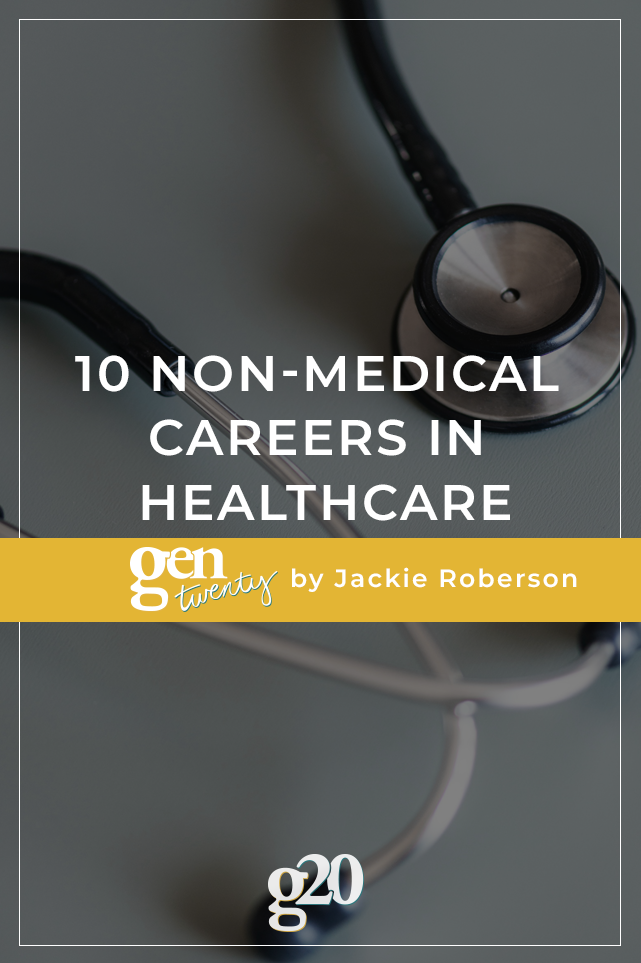This post is featured on behalf of Jackie Roberson.

In this economy, who has time to go to medical school? Jobs are available now, especially in the booming healthcare sector, so the sooner you can get qualified for a healthcare job, the better. What’s more, most emerging healthcare opportunities are not in medical practice but in administration, education, engineering and similar “background” fields.
Here are a few of the highest-paying positions you can get in healthcare without earning an M.D.:
Pharmacy
While doctors (and some nurses) prescribe medication, pharmacists dispense it and explain how to use the medication safely and effectively. To become a pharmacist, you do need to earn a Doctor of Pharmacy degree, which is only a four-year program, as well as pass two state licensing exams.
But in cases when you want to review and revise materials for better understanding, consulting learning resources focused on pharmacy would be one solution. After that, you qualify for a median salary of $116,670 and a job market that is increasing at 14 percent, faster than average.
Administration
Even doctors and nurses need managers to balance budgets, hire and fire staff, develop healthcare programs and otherwise direct operations at healthcare facilities.
Healthcare administrators are paid depending on how many medical professionals they manage; at the lower end, managing six or fewer doctors, you will earn a median salary of $86,459, and at the higher end, managing more than 26, you are basically guaranteed more than $150,726 in pay. Paths into healthcare administration vary, but it helps to have a job history in business management.
Engineering
Biomedical engineers work tirelessly to build the machines and devices medical professionals use to diagnose and treat patients. Tools like MRI machines were created by biomedical engineers, as are all prosthetics.
You can begin working in healthcare after earning a bachelor’s degree, but a master’s in biomedical engineering will increase your salary. The median salary for a bachelor’s degree–holder is $86,960, while the median salary for a master’s-holder is upwards of $98,539.
Social Work
Social workers who devote their efforts to healthcare assist clients in deciphering diagnoses and treatments, navigating specialists and insurance providers and otherwise understanding what is going on with their health.
This occupation does require a bachelor’s degree in a field related to social work, like sociology or psychology. Unfortunately, social work is notoriously underfunded, so you shouldn’t expect more than between $46,784 and $60,419 in salary.
Counseling
Mental health counselors — also called therapists — assist clients in understanding and working through their mental, emotional and behavioral troubles. Though they can’t prescribe medication like psychiatrists do, they can help clients with mental health in other ways.
Though it is possible to work in counseling with just a bachelor’s degree, to work unassisted as a counselor, you need a master’s in mental health counseling and state licensure. For that, you’ll earn roughly $60,000 in annual salary. You could also obtain a master’s in counseling and psychological services if you want to expand your employment potential.
Physical Therapy
Physical therapists help patients regain strength and mobility after injury or illness. As the healthcare industry begins to recognize PT as more integral to rehabilitation than previously thought, the demand for therapists is expected to increase 36 percent in the next decade. Pursuing physical therapist education can prepare you for this growing field, where you can make a significant difference in patients’ lives.
Licensing requirements vary by state; you might need to earn a bachelor’s degree, or you might slip by with a two-year professional degree. Regardless, you will qualify for a median salary of $79,860.
Insurance
Few people can afford healthcare out of pocket, so insurance underwriters are necessary for determining who, what, when and how much to cover.
While the American health insurance system remains in a tumultuous state, insurance underwriters can still earn healthy salaries of $62,870. Any bachelor’s degree will qualify you for these positions.
Diagnostics
There are dozens of different occupations within the healthcare field of diagnostics. Some that boast minimum training needs and high salaries include:
- Nuclear medicine technologist
- Radiation therapist
- Sonographer
- Cardiovascular technician
You can research more into these diagnostic medical careers if they are appealing to you.
Security
While physical security is necessary at many healthcare facilities, digital security is increasing in demand around the world.
After 2017’s crash of the U.K.’s National Health Services due to the malware WannaCry, most healthcare facilities are increasing their security efforts by hiring teams of cybersecurity professionals. Experience with network, endpoint and other digital security is all you need to procure such work, which pays an average salary of $116,000.
Education
Health educators improve community wellness by teaching the public about healthy habits. Like medical social workers, health educators aren’t highly valued despite their immeasurably positive contribution to society. Thus, you can expect high levels of fulfillment as well as a median salary around $43,840. To work in this role, you need a bachelor’s degree in public health, education or a similar field.
Doctors and nurses aren’t the beginning and end of healthcare; in fact, doctors and nurses couldn’t do much to help patients without most of the above-listed professionals. Though you might not be destined to practice medicine, you can still contribute to health and wellness by training for one of the above careers.
